I can imagine the Sultan riding a zebra. It looks funny.  We were promised maps! Were are the maps?!
We were promised maps! Were are the maps?! 
From Rus to Russia - Russia Megacampaign, pt.2
- Thread starter unmerged(59077)
- Start date
-
We have updated our Community Code of Conduct. Please read through the new rules for the forum that are an integral part of Paradox Interactive’s User Agreement.
You are using an out of date browser. It may not display this or other websites correctly.
You should upgrade or use an alternative browser.
You should upgrade or use an alternative browser.
"The Burgundian kings..."
I love it how in one masterful story, allusions to yet more stories are seamlessly integrated.
A masterpiece among EU3 AARs, and we haven't even left the 15th century
I love it how in one masterful story, allusions to yet more stories are seamlessly integrated.
A masterpiece among EU3 AARs, and we haven't even left the 15th century
I'm always impressed with the hybridity of your work . I also found this update to be calm . Lovely poetry and yes , our friendly Saracen is always impressive . I'm impressed by the way you can delve yourself into the cultural aspects of it without losing touch of your goal . A wonderful update . I loved the water imagery of the Seljuks too ! Rather poetic in itself 
canonized: Thank you for all the praise. The calm is of course deceptive; there's some intense decisions hiding behind the ritual politeness. The water imagery is not so much me as Ishak; the boy is probably a poor sailor, but wishes he wasn't. And for good reason - look at the map below!
Leviathan07: Very pleased to see you in this thread! It's worse than you think: the narrative hasn't even left the 14th century! But I promise it will. Eventually.
Vesimir: The Sultan has to have a hobby, right? Not as crazy as trying to breed tame cheetahs, of course. And map demands! Gods.
Enewald: Gah! You people are crazy. Map map map map!
Actually, I am thinking of making faux-period maps at some point, just not this time round.
Anyway, since you and Vesimir are terrorising me, here's a map. Mostly trying out new map symbols on this one.
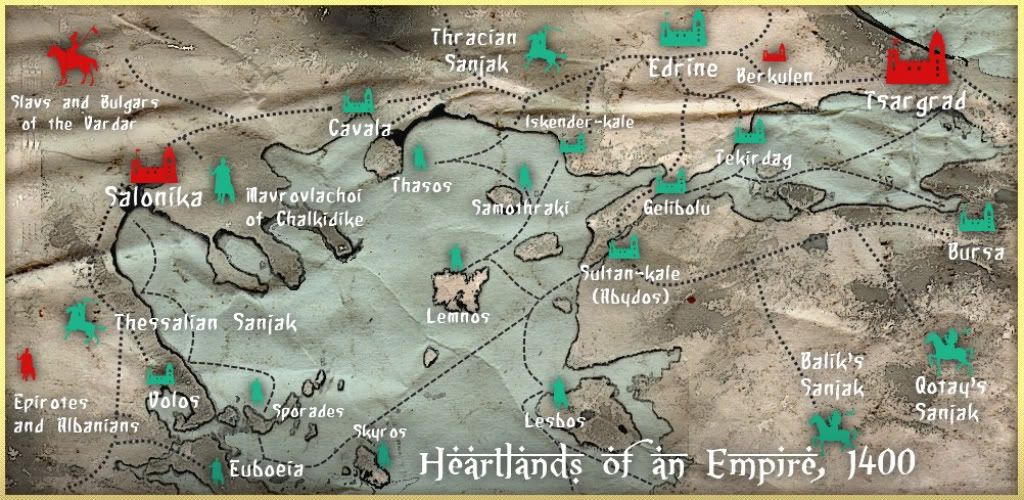
EDIT: for some reason, it won't show full size. HERE is a link.
Leviathan07: Very pleased to see you in this thread! It's worse than you think: the narrative hasn't even left the 14th century! But I promise it will. Eventually.
Vesimir: The Sultan has to have a hobby, right? Not as crazy as trying to breed tame cheetahs, of course. And map demands! Gods.
Enewald: Gah! You people are crazy. Map map map map!
Actually, I am thinking of making faux-period maps at some point, just not this time round.
Anyway, since you and Vesimir are terrorising me, here's a map. Mostly trying out new map symbols on this one.

EDIT: for some reason, it won't show full size. HERE is a link.
Last edited:
Leviathan07: Very pleased to see you in this thread! It's worse than you think: the narrative hasn't even left the 14th century! But I promise it will. Eventually.
Thanks, it's a pleasure to be here.
Still at the work place here, so can't read it in its entirety without being yelled at, but so far I can only commend you for the Arabic (?) poetry you're treating us with.
As for the map you just posted, I think the base is good, but the colour choices for the map icons might need a bit rethinking IMHO. But that's just because I by pre-order definition can't tolerate that turquoise colour
As for the map you just posted, I think the base is good, but the colour choices for the map icons might need a bit rethinking IMHO. But that's just because I by pre-order definition can't tolerate that turquoise colour
And so it begins--I for one hope Ishak succeeds, and forces the Turks into a more orderly process of succession than they had in real life...
The base for this one is simply amazing. It looks very... 'mappy'. Which is good. There's something I can't put my finger on though... Maybe you should try giving the symbols black outlines?
And it is terrorism. So you better deliver!
And it is terrorism. So you better deliver!
Very good stuff. Allusions to the zebra riding Sultan made for a wonderful picture in my mind! Ishak's dilemma is truly an intruiging one, and I too hope he is successful in becoming the next ruler, although to do so will require more than a hint of good fortune, if it is to be done without any great upheaval.
I like this Ishak. I suspect that he's going to prove to be a complete bastard (not in the literal sense) but he does have style. This court intrigue would be perfectly suited to a CK AAR; have you ever considered one of those? 
Answers part Deux
Enewald: so your love is cartographically conditional? Alas, what cruel readAARs I give my heart to. Especially in a narrative section!
Well, lesson learned. There will be at least one map per update henceforth.
Vesimir: there's only so many things you can do with GoogleEarth or such, and Paint.NET, but I think I may well be getting there for base maps. The black glow was meant to make the symbols stand out but the compression by Photobucket ruined it for me. Note: don't post anything over 1000 pixels wide on PB.
General_BT: to be able to force them into an orderly succession he has only to achieve two things: discredit the current succession and think up of a new one that everyone will accept! No problem at all - can totally be done if you go for an all-nighter!
morningSIDEr: noble sentiment; but two things that wise people say: God helps those who help themselves, and, for some, war is sweeter than his own mother. Those I believe, are significant factors in Ishak's future.
PS: That zebra line seems popular!
Milites: Apologies for the Turqouise, but they ARE Turks. Ha! As for the poem, yes it is Arabic. Which is fine; Ishak would have known it, it's after all the language of the Quran. Now wait a minute, what kind of kid is this? He speaks Greek and Turkish and Arabic and probably Persian, and rides and horse and shoots a bow and all those things? When does he find the time? To which I answer - well, that's the kind of education you'd expect. On the other hand he can't set up a server, measure anyone's blood pressure, or do a differential equation.
Take that, super-Sultan! These days you'd be best qualified for a period film extra, or head waiter in downtown Istanbul. Or both at once.
canonized, again - my friend, I must apologise. You asked me where the pictures were from and I totally blinked on that one. One of the unstated goals of this AAR is to showcase painters - by Russians, about Russians, or what is available if the above conditions cannot be met. You probably didn't mean the soldier pictures but all the stuff in the Religions collages etc.
Almost all of that is in fact by Nicholas Roerich, who really is a very evocative painter for all the measured paucity of detail in his work. He's starred in the AAR several times before and doubtlessly I will reach for his work again later.
Leviathan07: ahhhh...
Canst thou draw the leviathan with a plot-hook, or force his tongue to speak with a word?
Canst thou draw him in from the lurking beneath the sea-dark forum pages?
Will he keep offering suggestions? Will he speak to thee with gentle words?
Will he make covenant with thee and thou take him as thy commentator for life?
Of course, judging from the rest of that verse passage, the answer is no. I will keep hope.
Incidentally - book of Job. And Konrad's update is next. I think it may be a sign of something or other.
ComradeOm: you're not demanding more history-book? I am amazed!
Well, the road to the throne isn't for the meek nor even the especially nice, if they plan to succeed. That much is true. As is that other part about the CK thing. Does that mean you want a reprise of the Barbarian Empire, or that I should start a whole new story?
---------
New readers: to get the most of the next update, please look at A Brief History of Iceland and Konrad's First Chapter
Last edited:
From Rus to Russia
Waves of Blood and Grass
XII
Konrad
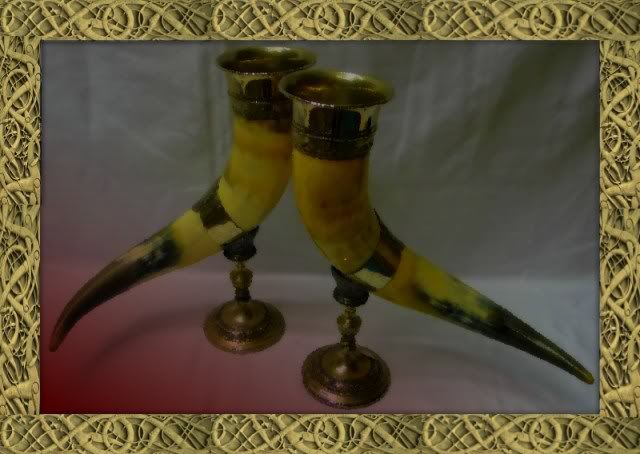
Waves of Blood and Grass
XII
Konrad

The bacon, fish and barley stew was dark and smoky like the portside tavern. Konrad watched with amusement as Petur put it away into his mouth like he would never have another bite again in his life. It was the second bowl already. Petur – God had protected the wretch after all – had returned from Vinland, not once but twice in the last four years, every time with money. Konrad’s investment had been paid off, but unwilling to lose a good thing, he left part of the debt in the venture, anticipating future gains. He even marked out another ship that he planned on buying to expand the trade.
As Petur ate, Stefan Konradsson returned from the larder with the delicacies – sliced headcheese and liver sausage, raw mutton that’s been hung and smoked, and, on a separate bowl, thin strips of fermented fish and some wild sorrel and garlic stems for contrast. Petur looked them over, then ladled himself another portion of the stew from the pot.
“Is it really that good?” Stefan asked, incredulously.
“Yes. Well, yes, in a sense. There’s no honest cereals to be found anywhere in Vinland. The Skraelings on the coast don’t grow any, and the Greenlanders cannot grow any. And if anyone grows anything on Olaf’s Head, they eat it all themselves. Always a bad lot, Bloody Olaf’s people.”
“It was almost the same here,” Konrad answered, “year before the last all the grains failed. This year we still have some saved from last year, when there was some harvest. But it’s no secret now – we import most of it – leeks and cabbages too.”
“A pity then. I was looking forward to your apples.”
“So was I, and I wasn’t planning to share.”
Petur stopped, then laughed uneasily.
“Now, now,” Konrad added conciliatorily, “I didn’t mean anything by it. It’s a joke.”
“You make jokes now?”
“People change. Some slower than others.”
“I’ve started to pay debts back, you mean,” Petur replied, then looked at the meat plates. He picked up a strip of mutton and chewed it, thoughtfully, then carefully picked out a sorrel leaf from the fish, wiped off the juice, and ate it too.
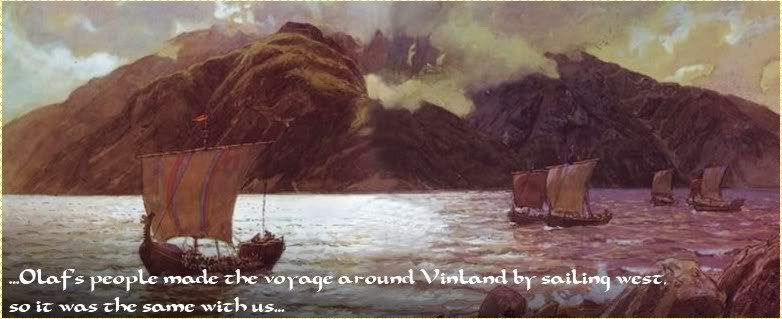
“The Skraelings are better fishermen than we are, or maybe it’s because they have better fish. Salmon, trout, you know. They preserve it with pine nuts and deer fat - they don’t turn it to…acid like we do. They think we are like bears, for doing that, or maybe people that turn into bears. There’s a place they call “where bears are hunted”, or something like that. I am not one to deny legends. I winter there. Petur the Bear and his brave adventurers. It’s tricky to get to, currents and fog. Keeps Olaf’s lot away and the Skraelings never come themselves, except their priests once or twice in the summer - to hunt bears of course. I stay away then. “
“They give you trouble?”
“Not as much as all that; the first thingi they ever held in Vinland, I was there, and wonder of wonders, everyone came, even One-Eyed Arne Olafsson. Someone had the presence of mind to bring the story of Leif Eriksson and Freydis up, and warn about staying peaceful. We are all mindful of that; we aren’t exactly bristling with weapons. All we have is our ships. But we’ve learned to trade; the Greenlanders say we’ve all gone soft and Danish. They only care about the lumber.”
“We really are Danish, if you go back far enough.”
“I may be Danish, but I think you’re a Garderikan!”
Konrad waved him on.
“Well, I promised to tell you about the Skraeling trade, didn’t I? And now is as good a time as any. It’s a big thing, Konrad, don’t take it lightly. There’s a lot of money to be made doing it right, and there’s more than just your head to be lost doing it wrong; and of course don’t share, please? There’s enough competitors as it is and you know our people and commercial competition.”
“We settle it with axes.”
“Yes we do. And it shames my ancestors, but I was never much good with the axe.”
“How did you happen upon this idea?”
“Oh, chance, desperation. Ancient knowledge.”
“How so?”
“The first time I went there, the captain sailed around the island and along a great gulf westwards of Vinland itself. We put in for water twice. After that, the natives started shadowing us. Well, we didn’t want trouble, so we kept away. We know Olaf’s people made the voyage around Vinland by sailing west, so it was the same with us…and I was thinking, maybe I should be back and trying to trade with them instead of hiding away. The sagas say that they were willing to trade, but the Greenlanders scared them away. But what would I do if they weren’t friendly?
So when we next put ashore in civilized lands, I wanted to know how one tries to speak to savages. Don’t laugh, I really did. And as chance would have it, a priest told me how. He said, you know, they are simple beings, and perhaps simplicity is the way to approach them. Leave them a gift. He said, my son, before man’s pride caused the sundering of the tongues at the ruins of Babel, we were all the same, and proper, godly conduct will bring out the same in the savage.

So the idea was when I reached a spot where I wanted to trade, I’d take ashore part of my cargo, and leave it on the ground. After that I go and stay in my ship. The natives would come out and place near my trade the goods which they wished to give in exchange. When they are done and go away, I’d come and collect the native trade and leave my own. If, on the other hand, they don’t offer me much, I just collect my things and sail away.”
Konrad burst out laughing.
“Such honest goodness in the savages! And what would a priest know of these things?”
“Ah, well. He read it in some book. Says the ancient Philistines did it with the native Moors. Perhaps the Skraelings were also of the Moorish tribe, I thought then, but now looking at them, maybe not so sure. The Moors are supposed to be blacker than the devil, no? You can laugh, except it works. I never trade with many of them at once – only one or two at a time, and on the shore, and that’s exactly how we trade; I place something, they place something. If I try to leave, they bring the price down. It’s good business. Then I sail away into the fog. And I always have two sailors with me, with mail and helmets for show, and I wear the brightest clothing I can find. It impresses them.”
“What do they want?”
“Different things. Cloth, mostly, brighter is better, but cloth isn’t all the cheap for us either. Metal tools, I’ve only given away once or twice. But they will take things that are not worth much to us – beads and such. I gave an important looking one a spare hourglass once. Best trade I ever made – a wolverine, ten beaver skins and a whole pile of squirrels.”
“They have furs?”
“Yes they do. And I’m not the only one trading; even those hel-sons of Olaf’s do, though they don’t admit it. They keep sheep and cows and trade away milk, just like in the Sagas. In any case, the big island’s Skraelings are a shy lot; they leave their camps behind when we come, and only trade furtively. The ones I found on Natakosta, they are more bold. But they also have better goods, including the dry salmon.”
Konrad shook his head, and said, questioningly: “so the place has furs, and salmon, and cows...”
Petur took another swig of beer out of the drinking horn, smiled, continued -
“..and timber. Crews sail in, finds a place where the natives aren’t occupying that season, break a camp, then cut the trees along Markland shore, or on the Island itself. Then you lash the wood together, like a big long raft, and sail it to the bigger settlements. Then sometimes the Greenlanders come for the wood. They need it for many things, but also for palisades. Now their natives are unfriendly – the Skraelings are not one tribe. They differ greatly from each other, though all be savages who know nothing of the Christ, so people say. I would get into the lumber business, but only if I could build a hulk that I could sail and break up on arrival. But there’s never enough nails to do that. The Basques get all suspicious if you try to buy them.”
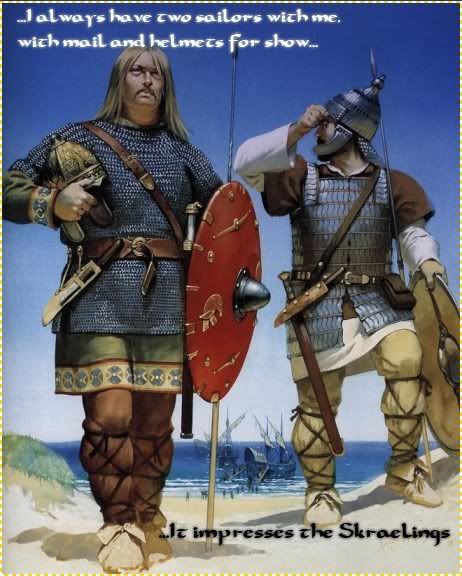
“The Basques now? What?”
“Well, consider this. We found the place. Why not them? They come for the cod. And they keep it secret! Even more than we do. Quiet-like, so their greedy Kings don’t find out. But they have big ships, Konrad, and they sail arrogantly. They’re very useful.”
“Useful? They take our cod!”
“Ah, but useful to me. Have you ever seen me unload furs?”
“No, I haven’t.”
“Because I don’t. I run into them on the fishing grounds, sell them the furs in small amounts, splitting it between the different captains. In return, they bring me other stuff that weighs little and a captain might sneak in.”
“Beads.”
“Oh yes, beads. Glass is cheaper in the south. And knives, and handkerchiefs. But no hooks. The Skraelings don’t use fish-hooks much, or make their own, they prefer the spear. Most of my business is done like that. I keep it small; make them think the cod is more valuable, that this is just a bit of diversion, otherwise they wouldn’t pay me the gold and ask too much for the trade goods, or come here for the trade themselves. So these Basques then, before putting in at home, they run into someone else – or so I am thinking, why would they tell me – and sell it to them, boat to boat. Like them Mahomedan fellows on the Biscays…now there’s a people who know their way around a market!”
“What is this wondrous land, where food is plentiful, furs can be had for a handful of glass, and traders are honest?”
“Ah…” and Petur became serious. “It’s a bountiful land, far more than Iceland, but in some ways, harder. We are not its native sons. Our crops will not always grow. People sicken there easily, and die, their gums rot and teeth fall out, and feebleness takes them. The Skraelings never suffer such things. And take the Skraelings – they are many; for every one of us, there’s a hundred of them, and though the forests seem empty, they know when you are on their land. And some are warriors, Konrad, fierce savages, bowmen and spearmen.”
“But you say they make things out of bone? Could we not beat them, like our ancestors beat the tribes of the East?”
“If I were Duke of Brittany, with a thousand knights, maybe I would try. But I am just a trader; we’d all get killed if we so much as attempted one little fight. And trust me – if the Duke of Brittany and his knights do come to Vinland, they will find it much easier to enslave us than fight the Skraelings. Put those thoughts from your head – Iceland is our place, and there, I think, we are guests. But no-one said guests can’t make a little money…or maybe a lot of money.”
“More than now?”
“Yes. This is even more of a secret than anything else I told you; the Basques say that they rescued another Icelander, Torres. I don’t know him, and that’s just them destroying some perfectly good name; but he told them, in gratitude, that he had been inland, and seen a great city, called Aranbeka. Now it lies on a river that is more than forty leagues wide at its entrance. It is full of Islands, which stretch some ten or twelve leagues each. On these islands lies this Aranbeka, with clever inhabitants, who trade in furs of all sorts; the town folk are dressed in furs, wearing sable on their collars and gold in their ears ... he even said they spoke Latin, or something that sounds like it, and they worship the sun in great temples, like giant steps leading to the sky and they are tall and handsome in form, and they ride great beasts across the river when it freezes in winter... And Konrad – they farm. They grow a plant that has to be extracted with heat and force from the leaves that surround it, and hiding inside is grain that they all eat, and they are many multitudes of them because of that.
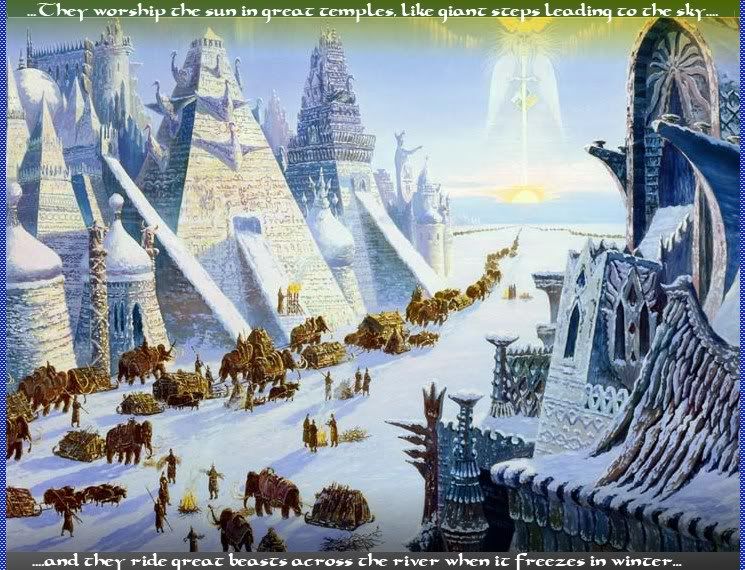
I thought about it, you know. It’s one thing to trade with the Skraelings, but another with civilised folk, even if they are heathens. But Torres has apparently vanished; nobody has seen him in Vinland. So I don’t know where this place is, and I don’t want to search without knowing. But I do want to find a place where one can put in on a proper ship, trade, and go home rich one day. To my wife and her children.”
Konrad shook his head slowly.
“Not yet, Petur. She is fine where she is.”
The merchant’s lips quivered.
“I see. Well, I did tell you all that I know, so what you can make of that is now yours,” he said “I am going to look for better opportunities, and I will find them, and be wealthier than all you turd-eating Godar put together. And she will forgive me. I know it. And I will come back, and you will not be able to keep her from me, you pompous horsecock! I won’t stop trying - ”
“Uncle Petur…” Stefan interjected with alarm, seeing both men grow red in the face with anger, Konrad’s eyes once again as murderous as the night his useless brother-in-law first appeared back in town.
Petur lifted his arm to silence the boy, and walked out of the tavern, head hung low.
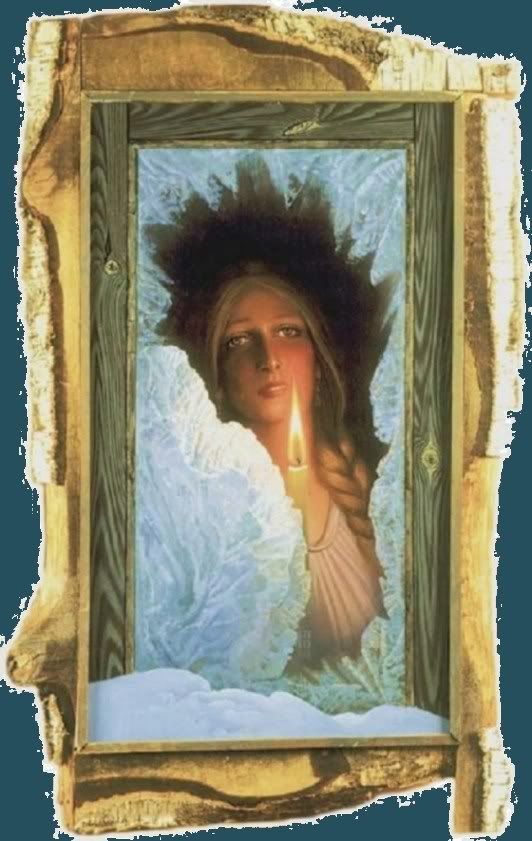
“He is restless and changeable as the sea, whatever the appearance now,” Konrad said, hoarsely, into the smoky darkness of the empty hall. “He hurt her badly. He will never be good for her.”
********
Historical Note - The distant, recent past: the Skraeling Centuries in myth and chronicles of settlement
Valdemar Pakue, Native Nations University of Hvalhofursland, Nyskaholt
Historical Note - The distant, recent past: the Skraeling Centuries in myth and chronicles of settlement
Valdemar Pakue, Native Nations University of Hvalhofursland, Nyskaholt
In an age where study of human mythmaking has reached a widespread, unspoken understanding that the surviving stories before us present patterns of thinking and ways of rationalising the world conceptually, it seems old-fashioned and quaint to treat the mythology of the modern Native Nations as based in actual history. Yet both Vinlandish and Native Nations scholars have recently done so, claiming that there's actual events behind some of the myths, and moreover, these are relatively recent, taking place in the years between the first documented arrival of Europeans to Columbia, and the large-scale colonization of the 17th century.
Among the Inuit, who are widely held to be the direct descendants of the “Thule” archaeological culture that arrived slowly over the Medieval Warm Period from Alaska and into the area previously occupied by the “Tuniit', an archeological culture whose only known probable descendants are the inhabitants of sparcely populated, tundra-bound islands in the great Bay of Bremen, and possibly Greenland's Helulings, descended from the Skraeling slaves of late medieval Norse. The new arrivals were in possession of several technologies of hunt and war lacked by the Tuniit, whom they displaced or assimilated. It also made them a threat to the Greenlanders, and their superiors in extracting resources from an increasingly icebound world, feeding themselves without relying on wood, metal or farming.
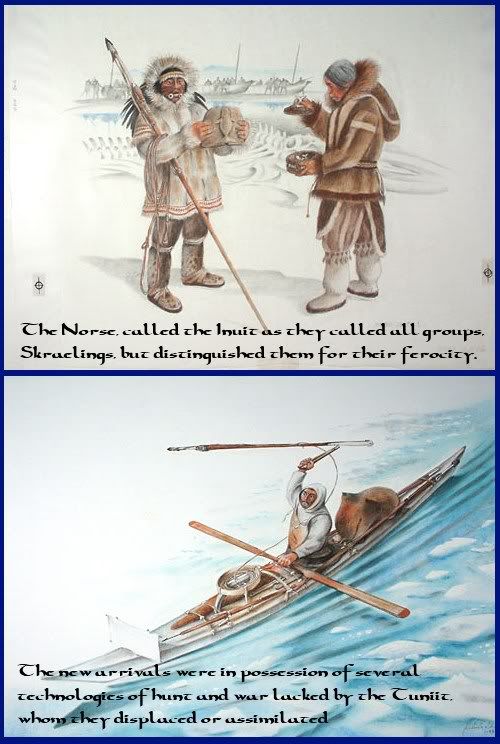
This story, derived from material remains, has now become a strong frame of reference to other Native Nations histories, because it bears out completely the myths of the various Inuit groups themselves; and the mythology is clearly situated in history. The Inuit have displaced the Hellulanders in the 1400s and invaded Greenland in the same timeframe, causing significant losses, by the standards of the day, to the Norse who rose to meet them. Without the activity of the Icelanders in the area the Eastern Settlement could fail like the Western before it. The Norse, for their own part, called this group as they called all groups, Skraelings, but distinguished them for their ferocity. The term “Frostling”, often used in novels about the period, appears a 19th century invention.
So who exactly were the Skraelings? Certainly this initially included only the Tuniit, and later also the Thule; but the Norse made contact with more territory, much of it outside the polar region. The settlements on Vinland proper must have come into contact with a people called the Beotheuka, whose language and the legends contained therein vanished by the mid-17th c. Known as the “shy Skraelings”, the Beotheuka avoided the Europeans, a strategy that kept them in relative peace until the ravages of disease and rising inmigration from Iceland and elsewhere in Europe allowed the Europeans to overwhelm them, and its survivors contributed only to the mixed population of the Norse house slaves; the genetic trace remained but the culture was lost.
The final two groups spoken of by the Icelanders are the “Bjarnlings”, sons of the Bear, a people who held ritual bear hunts on ground they held hallowed, and used spears to fish salmon; and the “Suderlings”, who lived south of Vinland and were noted for certain manners of craftsmanship, and whose absence is noted by the Breton, English and Irish explorers who were working from the Icelandic sources. The current, popularized story, useful for political purposes, proposes that the nations currently inhabiting the area are in fact the ones of legend; the Algonquin Innu, and the Gaspe Iroquois. There appears no easy way to test the proposition, except by following the example of the Inuit and comparing myth to archeology.
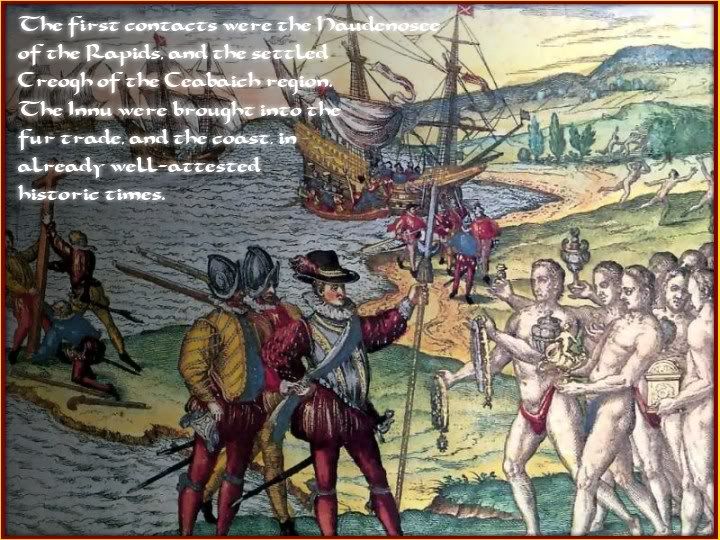
The Innu benefit from a comparison to Russia's warlike Chukchi, who had displaced the proto-Thule with their superior warmaking, and retained dominance until the arrival of the Cossacks, supported by the expansionist Yakut Khans. The Chukchi, meeting the Russians for the first time in the 17th c., describe them as fantastical beings – made of iron, with bronze walrus-like moustaches, and breathing fire. They are treacherous, unreasonable, and aggressive. They can conjure items that the Chukchi want – metal tools, tea, salt, sugar; in fact, that is why the gods created them in the first place. They can also bind by magic the non-Chukchi natives – Yakuts, Itelmens, Koryaks. The Innu have a strikingly similar set of legends, which sadly weren't well-documented until recently.
A figure of a magician appearing from the mists is prominent; he is a fearsome figure, who can summon goods that the Innu want, and exchanges them, seeking the blood of children. The Innu trick him and give him salmon or beaver, traditional food sources, instead. He is able to turn into a bear, or into mist. He also catches men with an iron mesh, imprisoning them and making them serve him. They have metal spears and are impervious to physical attacks, though fall easily to shamans. In one story, the Innu kill the magician, but his death inflicts a terrible curse on them, making them die in large numbers until they sacrifice a sanctified deer to the bear spirit.
Comparison with the Chukchi invites the idea that the magicians are in fact merchants from the sea, guarded by armoured men. Archeology suggests the Innu were in fact nomads and stayed away from the coast at the time of the 17th c. settlement. The first contacts were the Haudenosee of the Rapids, and the settled Creogh of the Ceabaich region. The Innu were brought into the fur trade, and the coast, in already well-attested historic times. So either these myths are very recent, or perhaps they imply a movement away from the coast and then back if indeed the Innu are the same people as the Bjarnlings. The Innu have also a legend that deals with the coming of their people into their land which is widely assumed to refer to the pan-Algonkjin expansion into the area of Hvalhofursland; but perhaps it also refers to their migrations away and then back to the coast.
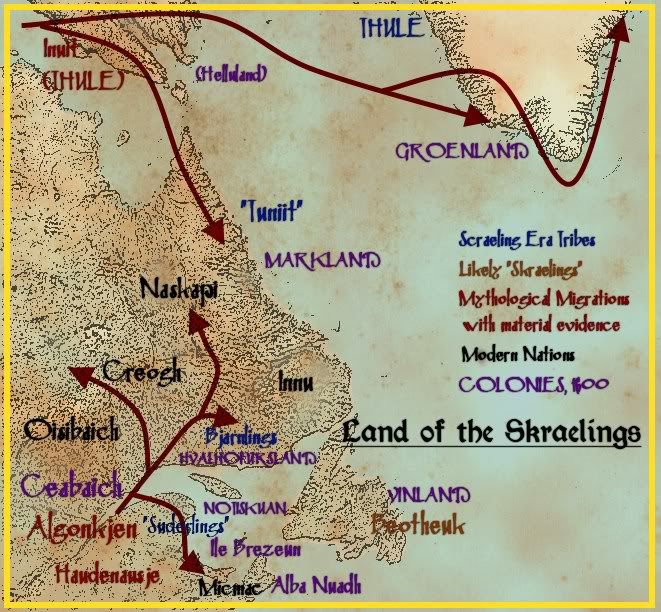
The key, I believe, lies in the story of the curse; it is assumed that the Icelanders did not attempt settlements away from Vinland itself until the early 16th c., but one can pre-suppose trade on a semi-permanent basis. An anchor found off Notiskuan, likewise known as “Bear Hunting Grounds” in the Vinlandisk language, suggests that the island was one of the hallowed hunting grounds of the Bjarnlings – and thus, the Innu as well – where the Norse may have come in contact with the Skraelings. Chronicles tell of several waves of disease striking the colonies and Iceland, so perhaps if trade interactions were involved, the same disease struck the Bjarnlings, and the bands farthest away from the coast did best; or the survivors moved away and reverted to nomadism. It may be productive to examine the Hvalhofursland natives' genetic markers to find signs or resistance to European diseases to confirm this theory.
By contrast, the Gaspe Iroquois, a politically separate group of the central Haudenausje alliance, have no stories about any foreign magicians, nor indeed of a death-curse. They also are recognized as different from the expected Skraeling peoples by the Bretons writing in the 16th c. The Iroquois warlike practices and active assimilation of conquered or tributary peoples are well-known. The stories of the southern coast add up to a different picture from that of the North Coast; the people replacing the Suderlings in the Gaspe peninsula are in fact wholly different from the Skraelings the Norse may have met. If I may offer speculation, the Suderlings, ravaged by disease like the Innu were, fell away from the coasts, and into the lands occupied by the proto-Iroquois, where their story ends.
Last edited:
Early immunity to some diseases?
Population of Americas sinks/drops earlier and might manage better than in otl 16th century?
Or the first big contacts in south will be less deadly?
Population of Americas sinks/drops earlier and might manage better than in otl 16th century?
Or the first big contacts in south will be less deadly?
I like the new names... "Ceabaich"? 
However, "Markland", how would that ever be a viable colony? I remember reading that the Norse might have gone there for timber, but the region (nowadays' Labrador) has such a terrible climate, that I seriously doubt a colony could survive more than 1-2 winters there. It's the worst of all worlds - subarctic temperatures (6-8 month per year below freezing), very little sunlight (on average, 8 days per month in July, less in the other months), and extremely slow plant growth due to these factors. Greenland at least has the gulf stream, Labrador doesn't even have that. The fool who tries to settle there, would probably pack up his things and leave for better settlements to the south, as soon as he realizes what a desolate hell-hole that place is.
However, "Markland", how would that ever be a viable colony? I remember reading that the Norse might have gone there for timber, but the region (nowadays' Labrador) has such a terrible climate, that I seriously doubt a colony could survive more than 1-2 winters there. It's the worst of all worlds - subarctic temperatures (6-8 month per year below freezing), very little sunlight (on average, 8 days per month in July, less in the other months), and extremely slow plant growth due to these factors. Greenland at least has the gulf stream, Labrador doesn't even have that. The fool who tries to settle there, would probably pack up his things and leave for better settlements to the south, as soon as he realizes what a desolate hell-hole that place is.
Awesome Vinland is awesome!
EDIT - A little more in depth:
Glad to see the Basque fishermen off the Grand Banks get some play in the tale of Vinland. That's a pretty clever scheme our Norseman had.
Aranbeka sounds like legends of the Aztecs/Mesoamericans have traveled north and been corrupted through the years, or in your alternate universe did the Cahokia peoples persist and form their own great federation?
EDIT - A little more in depth:
Glad to see the Basque fishermen off the Grand Banks get some play in the tale of Vinland. That's a pretty clever scheme our Norseman had.
Aranbeka sounds like legends of the Aztecs/Mesoamericans have traveled north and been corrupted through the years, or in your alternate universe did the Cahokia peoples persist and form their own great federation?
Last edited:
I have been reading numerous AAR's since I discovered them a few weeks ago and this one is by far my favorite thus far. Bravo sir! I am so inspired I may try my hand at an AAR one day. Keep up the amazing work! Oh and the maps as well, who doesn't love maps!?
Tremendous stuff. I love the tale of both trade and exploration going hand in hand, which seems to ever be the way. Petur's cunning methods in winning the cooperation of the natives, or perhaps not quite cooperation, but at least uncovering a way to allow for trade is very good. How things will develop from here will make for yet more interesting reading, as there seem to be a number of possibilities.

